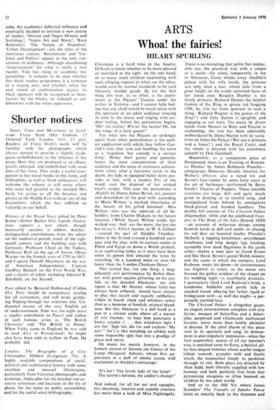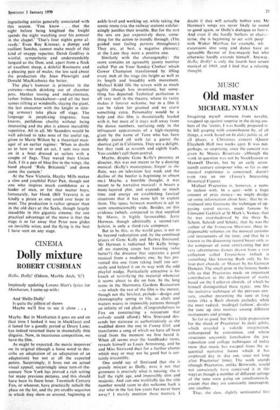ARTS
Whoa! the fairies!
HILARY SPURLING
Christmas is a hard time in the theatre. Difficult to know whether to be more pleased or mortified at the sight, on the one hand, of so many small children responding with such obliging rapture to what, on the other, would seem by normal standards to be such blatantly shoddy goods. By far the best thing this year, as so often, is the panto- mime at the Players' Theatre under the arches in Victoria—and I cannot help feel- ing that any child would be much taken with the spectacle of an adult audience swaying in time to the music and singing with evi- dent feeling, before the pantomime begins, 'Oh! the fairies! Whoa! the fairies! Oh, for the wings of a fairy queen!'
For what sets the Players so strikingly apart from other pantomimics is the earn- est application with which they follow Gar- rick's rule, that 'you can humbug the town as a tragedian, but comedy is a serious thing'. Hence their gaiety and panache, hence the stern concentration of their audience and the sense of strenuous achieve- ment when, after a fearsome tussle to the death, the lady in spangled ballet skirts pre- sides at last, with a modest flirt of the wand, over the disposal of her wicked rival's corpse. This year the pantomime is Aladdin by Henry James Byron, wit, punster and descendant of the poet with, according to Marie Wilton, 'a marked inheritance of the beauty of his gifted kinsman'. Miss Wilton—who was the admired of all be- holders, from Charles Dickens to the future laureate ('While Saucy Wilton winks her wicked way/ And .;ays the more, the less she has to say'), Alfred Austen, or W. S. Gilbert —created the part of Aladdin Twankey- Jones at the Strand around a hundred years ago; and the play, with its curious scenes in Pekin and Egypt or down a Welsh pitshaft, is as captivating today as it must have been when its genies first amazed the town by travelling 'At a hundred miles or over/Or faster than the London-Chatham-Dover'.
This revival has, for one thing, a mag- nificently evil performance by Robin Hun- ter, with green sequins glittering on his eye- lids, as the dreaded Abanazar: my sole regret is that Mr Hunter, whose forte has always been urbanity, should have chosen to play this occult and vaguely cabbalistic villain in beard, cloak and whiskers rather than as a monster of fiendish, oriental bland- ness. But this Abanazar is a dab hand at a pun or a sinister aside, above all a master of vile rhymes: to hear him punctuate a heavy couplet ('. . . that wondrous light cry for/ Sigh for, die for and exclaim "My eye!" for') is like watching an athlete turn some impossibly ugly feat into a prodigy of grace and nerve.
He meets his match, however, in the homely person of Jeannie (or Genie) of the Lamp (Margaret Ashton), whose first ap- pearance in a puff of smoke causes wild excitement in Aladdin's entourage: 'It's her! The lovely lady of the lamp! The nation's heroine, the soldier's champ!'
And indeed, for all her net and spangles, this charming, resolute and capable creature has more than a look of Miss Nightingale.
There is no mistaking that polite but implac- able eye, the practical way with a corpse or a castle—for when, temporarily in fee to Abanazar, Genie whisks away Aladdin's palace with his wife inside, the princess can only shed a tear, which falls from a great height on the wanly upturned faces of her loved ones. Rosalyn Dunbar is the lovely princess, Richard Dennis the helpful Genius of the Ring in spruce red frogging ('Oh, fie, I'm far from ignorant in such a thing/ Richard Wagner is the genius of tie Ring!') and Julia Sutton is sprightly and engaging as our hero. The music by divers hands from Mozart to Bizet and Puccini is enchanting; the text has been admirably embroidered by Denis Martin with sly varia- tions on Jones the Palace ('But can a princess wed a Jones?') and the Royal Court; and the whole is directed with his customary aplomb by Don Gemmel!.
Meanwhile, as a companion piece at Hampstead, there is an 'Evening of Roman- tic Drama' by James Robinson Planche- antiquarian, Somerset Herald, librettist for Weber's Oberon, also a noted wit and Byron's fore-runner by some forty years in the art of burlesque—performed by Barry Smith's Theatre of Puppets. These amiable creatures are large, deft and agile, much given to dancing or to tuneful song, and manipulated from behind by omnipotent black-gloved and hooded handlers. The double bill consists of The Chrystal Palace (Haymarket, 1844) and the celebrated Vam- pire or The Bride of the Isles (Strand, 1820) —an account of nefarious doings among Scottish lairds in dell and castle, or chasing the red deer on haunted heaths. Planche's McSwill, a topping henchman—protuberant kneebones and long dangly legs lurching agreeably over dank flagstones in the castle cellar—makes a neat pair to Good Evans and Dai Hard, Byron's genial Welsh miners; and the scene in which the vampire, Lord Ruthven, meets his doom—in circumstances too frightful to relate, as the moon sets beyond the gothic window of the chapel on his wedding night—is excellently dramatic. I particularly liked Lord Ruthven's bride, a handsome, biddable and portly lady in checked tweed, obeying her father, maid or bridegroom with—as well she might—a per- petually startled face.
The Chrystal Palace is altogether gayer, an elegant entertainment complete with airy fairies, masque of butterflies and a delect- able, perplexed and villainously maltreated heroine, never more than faintly plaintive in distress. If the chief charm of this piece rests in its spectacle and song, its denoue- ment is also singularly impressive—when the foul stepmother. source of all our heroine's woe, is snatched away by Envy, a baleful, pil- lar-box-shaped monster whose scarlet tongue lotions towards, grapples with and finally whirls the stepmother limply to perdition through its slot. Both plays are directed by Alan Judd, both liberally supplied with low humour and both perfectly free from that patronising smugness so often beamed on children by the adult world.
And so to the Old Vic where James Saunders' The Travails of Sancho Panza takes us smartly back to the tiresome and
ingratiating antics generally associated with this season. 'You know . . . that the night before being knighted the knight spends the night watching over his armour in the chapel.' That's four nights gone al- ready.' Even Roy Kinnear, a dumpy and resilient Sancho, cannot make much of this kind of snappy repartee; Detek Godfrey is wistful, sympathetic and understandably languid as the Don; and, apart from a flock of excellent sheep, a doleful Rosinante and a pleasing pair of mules, the less said about the production (by Joan Plowright and Donald MacKechnie) the better.
The play's humour is primitive in the extreme—much drinking out of chamber pots, blanket tossing and indiscriminate, rather listless knockabout—and all the best scenes (tilting at windmills, slaying the giant, the last encounter with the knight in shin- ing armour) take place off stage. The language is perplexing (ingrates, base knaves, perfidious churls) without being interesting and the plot is almost incredibly repetitive. All in all, Mr Saunders would be well advised to take note of the useful tip, given to Marie Wilton by a theatrical man- ager of an earlier regime: 'When in doubt as to how to end an act, I sent two men on in a boat dressed as sailors with a couple of flags. They waved their Union Jack, I lit a pan of blue fire in the wings, the band played "Rule Britannia" and down came the curtain.'
At the New Victoria, Hayley Mills makes a slim and youthful Peter Pan, though not one who inspires much confidence as a leader of men, or for that matter boys; fortunately, her Hook (Bill Travers) is as kindly a pirate as one could ever hope to meet. The production is rather sprucer than in the old days at the Scala, though largely inaudible in this gigantic cinema; the one practical advantage of the move is that the stage is so far away that Peter now glides on invisible wires, and the flying is the best I have seen on any stage.















































 Previous page
Previous page